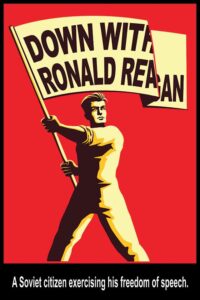Why should Christians defend the freedom for others to say and write things we wouldn’t?
****
Some years ago, an American diplomat was having a drink with his Russian counterpart in Moscow, capital of the Soviet Union. He was trying to explain to the communist what free speech means.
“In America, any citizen can just stroll around downtown Washington with a sign that says ‘Down with President Reagan’ and not get arrested. That’s what it means to have freedom of speech.”
“So what?” his Russian friend replied. “I can do the very same thing and not get in any trouble – I could march right into the Kremlin, right into Secretary Gorbachev’s office and yell ‘Down with Reagan’ and I wouldn’t get arrested.”
 *****
*****
This was one of many jokes President Reagan loved to tell to contrast Western freedom with Soviet repression. And the joke hints at an important litmus test for free speech, which is whether you are free to criticize your own government, laws, and society – in private or public.
The humble should want to be second-guessed (Prov. 18:17)
But why should a society, particularly a democratic one like Canada, allow its prevailing norms, beliefs, or behaviors to be questioned and criticized?
Because, we believe societies and governments – like any fallible person or group of persons – can be wrong. They often are. Truth exists. And truth trumps majority opinion, personal feelings, and political power. On that score, there are many examples of men speaking truth to those in positions of political power. They are recorded for us in the Bible and through Church history.
You might think of Nathan calling out David for his adultery with Bathsheba. Or you might think of how Samuel and Jonathan speak the truth to King Saul.
The proud make speech costly
Many other prophets dared to speak the truth to other kings of Israel and Judah. Jesus condemned Jewish authorities for killing these prophets. In Matthew 23, Jesus even points to a specific example recorded in Scripture, namely that of Zechariah in 2 Chronicles 24:20:
“Then the Spirit of God came on Zechariah, son of Jehoiada the priest. He stood before the people and said, “This is what God says: ‘Why do you disobey the Lord’s commands? You will not prosper. Because you have forsaken the Lord, he has forsaken you.’” But they plotted against him, and by order of the king [Joash], they stoned him to death in the courtyard of the Lord’s temple.”
Or, consider the example of the Apostle Paul. In Acts 17 we read about how Paul went about his work. In the first part of Acts 17 he’s in Thessalonica. We read:
“And Paul, as was his custom, went into the synagogue, and on three Sabbath days he reasoned with them from the Scriptures, explaining and proving that the Messiah had to suffer and rise from the dead. “This Jesus I am proclaiming to you is the Messiah,” he said. Some of the Jews were persuaded and joined Paul.”
Let’s contrast that with the conduct of those who don’t like what Paul is saying:
“[Others] formed a mob and started a riot in the city […] [and] they dragged Jason and some other believers before the city officials, shouting: ‘These men who have caused trouble all over the world have now come here, and Jason has welcomed them into his house. They are all defying Caesar’s decrees, saying that there is another king, one called Jesus.’”
These guys seem pretty politically savvy. Whip up a mob. Cause a riot. Blame your opponents’ message for your behavior. Get officials to silence them.
The wise will challenge speech
Then Paul goes on to Berea, where we read that the Jews were “noble” and that they “eagerly examined the Scriptures to see if Paul’s teachings were true.” Then we go on to read about Paul in Athens later in the chapter:
“[Paul] reasoned in the synagogue with both Jews and God-fearing Greeks, as well as in the marketplace day by day with those who happened to be there. And a group of Epicurean and Stoic philosophers began to debate with him. […] And they took Paul and brought him to a meeting of the Areopagus, where they said to him, “May we know what this new teaching is that you are presenting? You are bringing some strange ideas to our ears, and we would like to know what they mean” (Acts 17:17-20).”
The response to Paul by those interested in the truth is to investigate, discuss, and debate. The response of those interested in preserving their power rather than pursuing truth is to silence Paul by force. But the truth of Christ is more powerful than the force of rulers.
In 2 Corinthians 10, Paul uses a military metaphor to explain gospel ministry:
“Though we live in the world, we do not wage war as the world does. The weapons we fight with are not the weapons of the world. On the contrary, our weapons have divine power to demolish strongholds. We demolish arguments and every pretension that sets itself up against the knowledge of God, and we take captive every thought to make it obedient to Christ.”
Demolishing strongholds and taking captives – not with the sword, but the truth of God’s Word. Now, of course, Paul and the Apostles spoke the truth, as we must, regardless of whether the law protects our freedom to do so. It is good to defend the freedom to share the truth. Paul defended himself using his rights as a citizen, for example, with the goal of bearing witness to Christ.
God hates compelled speech
Other early Christians advocated for freedom to preach and practice the gospel, arguing that religion is a matter of the heart and cannot be coerced.
In A.D. 197, Tertullian wrote his Apology as a defense of persecuted Christians. He addressed it to the Roman authorities. Tertullian says it is “a privilege inherent in human nature that every person should be able to worship according to his own convictions.” Coercion in religion, he argues, only fosters irreligion and hypocrisy. Tertullian contends that “heretics and philosophers study the same themes as believers: what is the origin of evil, and why? The origin of humans, and why?” He also appeals to the image of God in man, with an emphasis on man’s reasoning and decision-making capacity.
God has used speech
The ability to disseminate views increased dramatically with the invention of Gutenberg’s printing press in the mid-1400s. It made books and pamphlet printing far faster and cheaper, making written materials widely accessible. A few decades later, the Catholic Church did not like much of what it saw coming off the press, so in 1487 the Pope issued a papal bull calling for regulation of the press. That did not accomplish much. So, the next Pope – Leo X – issued a stronger papal bull in 1515 forbidding publishing without prior authorization from the Church.
Leo X did so just in time for Luther. By 1521, the Pope’s envoy in Germany wrote to the Pope to bemoan the “daily downpour of Lutheran tracts in German and Latin. Nothing is sold here except the tracts of Luther.” Luther called the printing press “God’s highest and extremest act of grace whereby the gospel is driven forward.” The data backs Luther up. The Reformation spread faster in towns that had printing presses. And in turn literacy grew fastest in places where the Reformation took hold, as it did firmly in the Netherlands. Between 1600 and 1800 no one read or printed more than the Dutch. Their literacy and rate of literary consumption by the late 1600s quadrupled that of France or Italy.
Speech can be misused
Now there’s also no denying that the printing press and the explosion of religious pamphlets allowed some strange flowers to bloom. Radical Anabaptists had very odd and heretical teachings and were early victims of persecution. Luther said of this persecution, “I am deeply troubled that the poor Anabaptists are pitifully put to death. Let everyone believe what he likes. If he is wrong he will have punishment enough in hell. Unless there is sedition, one should oppose the Anabaptists with God’s Word.”
Luther was not always consistent with this principle. He supported censorship of certain Anabaptist writings as well as Zwinglian pamphlets. Calvinists exercised censorship too – for example, when the Presbyterians controlled the Parliament of 17th century England and forbade publishing books or tracts without prior license from Parliament. But the Presbyterians were opposed by various Puritans including an important Reformed political thinker named John Milton. You may know him as the author of the epic poem Paradise Lost, but he was also a very important political thinker and advocate.
John Milton, on iron sharpening iron
In 1644, during the first English Civil War between Parliament and the Crown, John Milton published an unlicensed pamphlet attacking an Order of Parliament from the year before that prohibited publishing anything unless it had first received a license from the censors appointed by Parliament. Milton titled his great free speech pamphlet Areopagitica – in reference to the Areopagus in Athens and likely to Paul’s visit there recorded in Acts 17. Milton’s unlicensed pamphlet would prove very influential in later English and American and Canadian history. So let’s follow its argument.
Milton was concerned about how we, as human beings made in God’s image, promote the truth. Option number one is through reading widely, considering different opinions, and thinking critically. Iron sharpens iron, as the proverb goes. Option one has an optimistic view of the truth, that the Truth with a capital T will ultimately triumph. The only way this can happen, though, is if citizens have the freedom of expression needed to discover the truth by considering God’s revelation for themselves.
But Milton anticipated a common objection: won’t the freedom of expression allow bad ideas to spread? That leads us to option number two to promote the truth: through force. Underlying this second belief is the presumption that the Truth will lose out, unless we force others to adopt it. In their eyes, truth will ultimately lose in a fair fight. The only way to maintain the truth – if they even believe in objective truth – is to allow some people to decide what truth is and enforce it upon everyone else.
So those who wish to restrict the freedom of expression have little confidence in the power of the Truth. Or, alternatively, they might even think Truth is powerful, but they hate it and wish to supress it.
Milton uses the example of the Bible. If you want to stomp out heresy and inappropriate content, then you might consider banning the Bible too. We all know churches or people who have twisted the Bible to promote their own opinions. The Bible also has graphic descriptions of sin (ex. the final chapters of Judges) and even suggestive descriptions of goodness (ex. the Song of Solomon). That’s why the Roman Catholic Church did not allow the Bible to be printed in the common language: because they did not trust common people to interpret it.
But truth doesn’t come from the Pope or from the King. It is found in God’s revelation of Himself, a revelation that He has given to all mankind.
Some speech needs to be policed
Now, just because we believe in freedom of expression doesn’t mean that the government may never regulate any type speech. The Bible speaks of many sins of the tongue. The government does have a role in regulating some speech, such as outlawing perjury, which is bearing false witness in court. Some forms of speech constitute injustices against others in themselves, such as libel, threats, or fraud.
But it is not the responsibility of the government to police all the sins of the tongue. Some of these judgements are reserved for other spheres of authority: elders in the church combat heresy, parents in the home police unkind words, bosses in the workplace punish false advertising, and even individuals in their own minds need to guard against ungodly thoughts.
…but the bigger problem is truth being restricted
However, the problem today isn’t so much that governments in Canada are trying to combat sins of the tongue that are outside of its responsibility. Instead, the main problem today is that they are more and more punishing speech that proclaims the truth and is glorifying to God or, relatedly, speech that challenges the prevailing ideologies and idols of our day.
We can think of Canada’s conversion therapy ban, which makes it illegal to promote a biblical view of gender and sexuality in some settings. We have bubble zone laws that prevent pro-lifers from talking about abortion in any way around hospitals and abortion clinics in some provinces. One Ontario MPP proposed another type of bubble zone that outlaws the proclamation of God’s design for human gender and sexuality in certain areas. A growing number of municipalities and, again, another Ontario MPP are proposing to ban pro-life literature.
This onslaught against free speech is what Christians need to stand up to. We may very well disagree with the manner that it is presented in. Perhaps such speech was spoken in anger or with inappropriate exaggeration. We might even disagree with the truth of the speech itself. We might think that what our neighbor is saying runs contrary to some biblical principles. But if we neglect to defend free speech, we are essentially saying that we don’t think that the Truth will triumph but that lies will always overcome the Truth unless put down by the force of law.
But we have every confidence that the Truth will prevail. So let us defend the right of our neighbors to speak what they think is true so that every obstacle to the preaching of the gospel may be removed for us as well.















